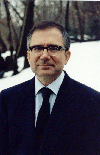A year and a month ago, on September 23, 2006, the Executive Council of the Committee for the Scientific Investigation of Claims of the Paranormal (CSICOP) met and decided to change the name of the organization to the Committee for Skeptical Inquiry (CSI). (CSICOP becomes CSI… [press release], November 30, 2006)
The January-February 2007 issue of the Skeptical Inquirer reflected the name change, and an article by editor Kendrick Frazier explained the decision. It included a revealing passage:
“Finally, many academics and others just didn’t want to be associated at all with anything with the paranormal in its name, no matter the context. Many of us understood, and some even shared the feeling.” (Frazier et al, 2007, p. 6)
This statement directly acknowledges that many status-conscious academics feel the stigma associated with the paranormal. This is despite the fact that CSICOP has had numerous high-profile scientists, including Nobel laureates, on its roster. Yet those credentials were insufficient to overcome the taint. Even debunkers are contaminated by associating with the paranormal.
This fact is important, but it is nothing new. For thousands of years, the paranormal/supernatural has been marginalized. There have been restrictions on approaching the realm, and rituals of purification were often required.
The ancient taboo is still active today. Members of religious congregations often encounter direct prohibitions. Within academe, derision and ridicule enforce the taboo—and CSI serves as an agent of enforcement.
But the stigma of the paranormal is not just any taboo. It’s fundamental to the nature of taboo itself. Freud had some insight into this. Drawing upon anthropological findings, in Totem and Taboo he noted that:
“For us the meaning of taboo branches off into two opposite directions. On the one hand it means to us, sacred, consecrated: but on the other hand it means, uncanny, dangerous, forbidden, and unclean.” (Freud, 1913/1961, p. 26)
The paranormal/supernatural is intimately associated with the sacred. Many debunkers seem to understand that fact, and it is no accident that CSI is thoroughly tied to anti-religious, rationalist, and atheistic groups. Parapsychologists, on the other hand, are largely oblivious to the connection.
The supernatural and the divine are part of the human condition, but they are non-rational. They can be studied empirically; patterns can be discovered and observed, but there are limits to knowledge of them.
Professional parapsychology is currently dominated by psychologists and physicists. They are largely unfamiliar with the concepts, tools, and methods of analysis developed in the humanities and social sciences. As such, they fail to comprehend the extent of their predicament, and the reasons for their marginality. This situation is unlikely to change any time soon.
References
CSICOP becomes CSI after thirty years: Name change reflects growth, focus on science and reason [press release]. Amherst, N.Y. (Nov. 30, 2006). Available at: http://www.csicop.org/about/csi.html. Accessed October 22, 2007.
Frazier, Kendrick, and the Executive Council. (2007). It’s CSI Now, Not CSICOP. Skeptical Inquirer, Vol. 31, No. 1, January/February. pp. 5-6. Article available at: http://www.csicop.org/specialarticles/csicop.html. Accessed October 22, 2007.
Freud, Sigmund. (1961). Totem and Taboo: Resemblances Between the Psychic Lives of Savages and Neurotics. (Translated by A. A. Brill). New York: Vintage Books. (Original work published 1913)
Tuesday, October 23, 2007
Subscribe to:
Comments (Atom)
